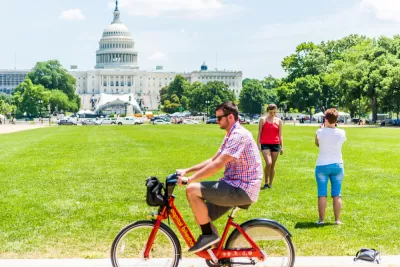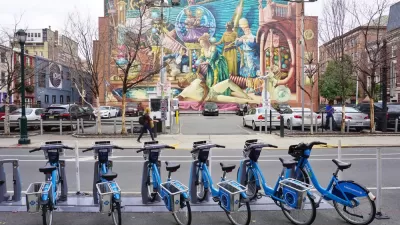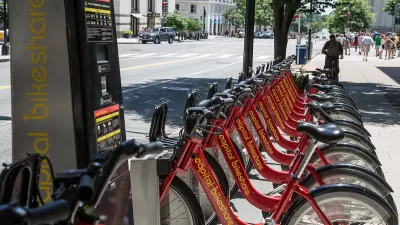New research shows that bike share use has a positive impact on public health, even in less bikeable cities.

According to a new study from Colorado University–likely "the first study to quantify the public health benefits of U.S. bicycle sharing systems"–bike share systems "saved the national healthcare system more than $36 million, despite the fact that there are only about 100,000 shared bikes in the country and many are located in dangerous, car-dependent cities." Bike share users, writes Kea Wilson, "were saved a collective total of 737 'disability adjusted life years,' or years spent living with debilitating health conditions such as cancer, dementia, and ischemic heart disease, thanks to the preventative power of active transportation."
But "the life-saving potential of bike share is limited by the deadly reality of car dominance. The researchers found bike share users had a marginally higher risk of dying in traffic crashes or from pollution-related ailments compared to drivers or transit riders, although they also had a much lower risk of dying from diseases related to physical inactivity than their inactive counterparts." However, no U.S. bike share users were killed between 2007 and 2014, making it a remarkably safe travel mode. David Rojas-Rueda, one of the study's authors, says "the remaining risks of bike share can be mitigated through good Vision Zero planning. But the public health risks associated with sedentary modes such as driving are baked in."
FULL STORY: Study: Bike Share Saves the U.S. $36 Million Public Health Dollars Every Year

Maui's Vacation Rental Debate Turns Ugly
Verbal attacks, misinformation campaigns and fistfights plague a high-stakes debate to convert thousands of vacation rentals into long-term housing.

Planetizen Federal Action Tracker
A weekly monitor of how Trump’s orders and actions are impacting planners and planning in America.

In Urban Planning, AI Prompting Could be the New Design Thinking
Creativity has long been key to great urban design. What if we see AI as our new creative partner?

King County Supportive Housing Program Offers Hope for Unhoused Residents
The county is taking a ‘Housing First’ approach that prioritizes getting people into housing, then offering wraparound supportive services.

Researchers Use AI to Get Clearer Picture of US Housing
Analysts are using artificial intelligence to supercharge their research by allowing them to comb through data faster. Though these AI tools can be error prone, they save time and housing researchers are optimistic about the future.

Making Shared Micromobility More Inclusive
Cities and shared mobility system operators can do more to include people with disabilities in planning and operations, per a new report.
Urban Design for Planners 1: Software Tools
This six-course series explores essential urban design concepts using open source software and equips planners with the tools they need to participate fully in the urban design process.
Planning for Universal Design
Learn the tools for implementing Universal Design in planning regulations.
planning NEXT
Appalachian Highlands Housing Partners
Mpact (founded as Rail~Volution)
City of Camden Redevelopment Agency
City of Astoria
City of Portland
City of Laramie





























